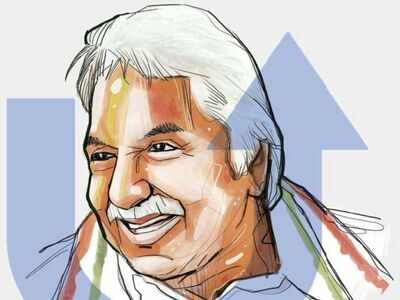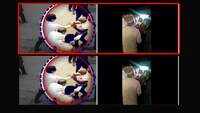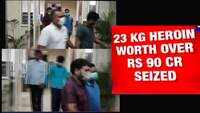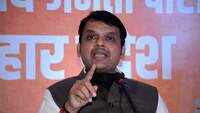
Oommen Chandy likes to be with the masses. A day in his life is incomplete without meeting people and listening to their problems, even if he doesn’t hold any office.
During the lockdown and amidst the pandemic season too his routine has not changed. Sitting at his ‘Puthuppally’ house in Poojappura in Thiruvananthapuram, he is busy talking on the phone with people from different corners of the world. Three of his staff huddle around him, taking calls and jotting down details from callers.
“During the lockdown, most of the calls I received were from students and others who got stranded in various places. Now, people are badly hit because there is no work for them. I am helping them as far as I can,” says the former chief minister.
But such an attachment with the masses did not begin after he donned a minister’s or a chief minister’s role. It dates back to 1970, during his first election. At the time, Congress was facing a split and Sanghatana Congress was growing powerful.
“There was no committee in Puthuppally for the Congress and there was no party. Only three people in the 21-member party committee were left in Puthuppally: KK Damodaran, C K Jacob and C K Punnan. The rest of them had joined the other side. The party saw little chance of winning the constituency,” remembers Chandy.
Chandy was taking on sitting MLA E M George and P C Cherian of the Sanghatana Congress. “It was a triangular fight. At the time, Union minister Fakhruddin Ali Ahmed had come to Kerala for campaigning and he was brought to Puthuppally for attending a convention. With the help of a few KSU and Youth Congress workers, we managed to organize a convention, which was the turning point of my career,” says Chandy.
In that convention, two youth leaders who had switched over to the other side returned to Congress and Fakhruddin Ali Ahmed gave them the party membership. It hit the headlines the next day and from then on deserters who left the party started trooping back to its fold. Finally, P C Cherian decided not to contest and he left for Chennai before the election. Chandy won the election by defeating the sitting MLA by 7,288 votes.
“I will say it was the people who stood by me in that election. When there was no party or any committees to work for me, the people of Puthuppally took me to their heart and I decided to be with them always,” he says.
It was the beginning and Chandy has been with them ever since. He still holds a weekly durbar at his house in Puthuppally to listen to the problems of people, an initiative he began soon after becoming an MLA.
“Only during the lockdown I could not go and meet them. But I was still in touch with people over the phone. They call me and I do whatever I can to resolve their issues. I make it a point that I am at the constituency at least twice a week,” he says.
It was his weekly durbar at Puthuppally that served as a prototype for the mass contact programme kicked off by him later when he became the chief minister.
Everyone had flayed the idea and asked whether the chief minister was doing the job of a village officer through such mass contact programmes. But it ended up benefitting the people, he says.
When people started approaching him with several representations and memorandums about various issues, it came to his notice that though actions were taken on such complaints, people were turning up with similar grievances again and again.
“The decisions were being taken at government-level but they were not getting implemented at the grassroots level. People were not getting the benefits and hence I decided to act. People are supreme and government decisions have to reach them. That is why I went ahead with accepting complaints directly from people. Just about only 18 lakh people were receiving their welfare pensions, and their numbers went up to 34 lakh,” says Chandy.
During the lockdown and amidst the pandemic season too his routine has not changed. Sitting at his ‘Puthuppally’ house in Poojappura in Thiruvananthapuram, he is busy talking on the phone with people from different corners of the world. Three of his staff huddle around him, taking calls and jotting down details from callers.
“During the lockdown, most of the calls I received were from students and others who got stranded in various places. Now, people are badly hit because there is no work for them. I am helping them as far as I can,” says the former chief minister.
But such an attachment with the masses did not begin after he donned a minister’s or a chief minister’s role. It dates back to 1970, during his first election. At the time, Congress was facing a split and Sanghatana Congress was growing powerful.
“There was no committee in Puthuppally for the Congress and there was no party. Only three people in the 21-member party committee were left in Puthuppally: KK Damodaran, C K Jacob and C K Punnan. The rest of them had joined the other side. The party saw little chance of winning the constituency,” remembers Chandy.
Chandy was taking on sitting MLA E M George and P C Cherian of the Sanghatana Congress. “It was a triangular fight. At the time, Union minister Fakhruddin Ali Ahmed had come to Kerala for campaigning and he was brought to Puthuppally for attending a convention. With the help of a few KSU and Youth Congress workers, we managed to organize a convention, which was the turning point of my career,” says Chandy.
In that convention, two youth leaders who had switched over to the other side returned to Congress and Fakhruddin Ali Ahmed gave them the party membership. It hit the headlines the next day and from then on deserters who left the party started trooping back to its fold. Finally, P C Cherian decided not to contest and he left for Chennai before the election. Chandy won the election by defeating the sitting MLA by 7,288 votes.
“I will say it was the people who stood by me in that election. When there was no party or any committees to work for me, the people of Puthuppally took me to their heart and I decided to be with them always,” he says.
It was the beginning and Chandy has been with them ever since. He still holds a weekly durbar at his house in Puthuppally to listen to the problems of people, an initiative he began soon after becoming an MLA.
“Only during the lockdown I could not go and meet them. But I was still in touch with people over the phone. They call me and I do whatever I can to resolve their issues. I make it a point that I am at the constituency at least twice a week,” he says.
It was his weekly durbar at Puthuppally that served as a prototype for the mass contact programme kicked off by him later when he became the chief minister.
Everyone had flayed the idea and asked whether the chief minister was doing the job of a village officer through such mass contact programmes. But it ended up benefitting the people, he says.
When people started approaching him with several representations and memorandums about various issues, it came to his notice that though actions were taken on such complaints, people were turning up with similar grievances again and again.
“The decisions were being taken at government-level but they were not getting implemented at the grassroots level. People were not getting the benefits and hence I decided to act. People are supreme and government decisions have to reach them. That is why I went ahead with accepting complaints directly from people. Just about only 18 lakh people were receiving their welfare pensions, and their numbers went up to 34 lakh,” says Chandy.

Coronavirus outbreak
Trending Topics
LATEST VIDEOS
City
 On cam: Navy veteran brutally beaten up by Shiv Sena goons for satirical WhatsApp forward
On cam: Navy veteran brutally beaten up by Shiv Sena goons for satirical WhatsApp forward  Delhi: International drug racket busted; Kingpin nabbed, Rs 90 crore worth heroin seized
Delhi: International drug racket busted; Kingpin nabbed, Rs 90 crore worth heroin seized  SSR death probe: Drugs were sent through courier from Sushant's house to Rhea's during lockdown
SSR death probe: Drugs were sent through courier from Sushant's house to Rhea's during lockdown  Sushant Singh Rajput is ‘beta’ of Bihar: Devendra Fadnavis
Sushant Singh Rajput is ‘beta’ of Bihar: Devendra Fadnavis
More from TOI
Navbharat Times
Featured Today in Travel
Quick Links
Kerala Coronavirus Helpline NumberHaryana Coronavirus Helpline NumberUP Coronavirus Helpline NumberBareilly NewsBhopal NewsCoronavirus in DelhiCoronavirus in HyderabadCoronavirus in IndiaCoronavirus symptomsCoronavirusRajasthan Coronavirus Helpline NumberAditya ThackerayShiv SenaFire in MumbaiAP Coronavirus Helpline NumberArvind KejriwalJammu Kashmir Coronavirus Helpline NumberSrinagar encounter
Get the app



